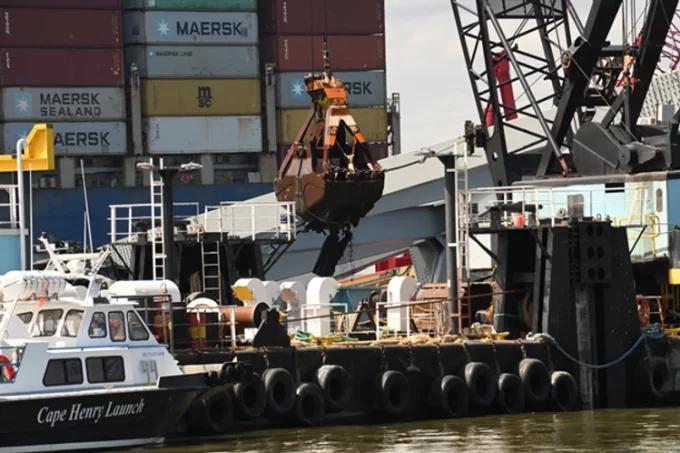MSC Aries crew set for release 'on humanitarian grounds', says Iran
The crew of the seized containership MSC Aries are reportedly set to be released after ...

Cargo stakeholders affected by the incident at Francis Scott Key Bridge could be required to pay security deposits before they get their cargo back, as General Average has likely been declared.
On 26 March, the 9,000 teu Dali crashed into a support pylon of the Francis Scott Key Bridge, causing significant damage to the ship, on-board cargo, and the bridge itself. The tragic incident also took six lives.
As the maritime industry grasps the sheer scale of destruction, questions have been raised about who will ultimately pay for damages.
Maritime claims consultancy WK Webster announced yesterday: “Further to our recent casualty advices, it is understood that General Average (GA) may now have been declared.”
Patrizia Kern, chief insurance officer at embedded cargo insurance provider Breeze, previously told The Loadstar that this was one of the “most complex procedures in insurance”.
General Average is a maritime principle where all parties involved in a sea voyage share any losses incurred. The share a shipper will pay correlates with the share of the cargo. The shipowner, manager, and charterer will also be partly liable.
“Consequently, General Average security will be required from all cargo interests prior to the delivery of their cargo,” WK Webster said.
General Average security is an estimated fee for an individual’s cost share of the damage, this needs to be paid before their cargo can be released.
Insurers will then need to calculate the actual value of all the goods onboard the vessel to work out the amount owed by each shipper, a process known as GA adjustment, which can take years to complete.
WK Webster advised its customers: “We would strongly urge that any instructions and/or documents are provided to us as soon as practically possible so that suitable GA securities are issued in a timely manner to allow for the release of cargo upon reaching ports of destination.
“We also confirm having instructed an expert marine surveyor to investigate the cause of the allision so that we may evaluate the merits of any potential defences to contribution in GA that may be available to cargo interests,” it added.
Skip to 9:12 on the latest episode of The Loadstar Podcast to hear guests discuss the ‘blame game’ of the Francis Scott Key Bridge cost breakdown:
Usually, GA cannot be called until a ship casualty is freed from its position and taken to a place of refuge, as happened with the Ever Given when General Average was only called once the vessel had been re-floated and towed up to an anchorage point at the northern end of Suez.
Alison Cusack, founder and principal lawyer at Cusack & Co, told The Loadstar: “You can declare General Average, but General Average expenses are for saving the marine adventure.
“Until you saved the marine adventure only then does it really kick in – if the ship doesn’t successfully complete its marine voyage/adventure then General Average does not come into play.”
However, Ms Cusack did suggest that the early removal of some containers from the Dali’s deck may have prompted the GA call.
“They may have preemptively declared it for the boxes they took off as part of salvage to capture them in the event they can declare General Average and recoup GA-related incurred expenses, as per the York-Antwerp rules,” she said.
Comment on this article
Marta Beatriz Castro
April 13, 2024 at 3:41 amFrom my experience as a claims manager for shipping lines and having dealt with various GA (General Average) incidents, I believe it is important to clarify that once declared, a “refuge” port must be designated where the vessel will dock. All cargo on board will be temporarily detained until each cargo owner presents the corresponding documents defining the CIF value of their goods. This information will be reflected in the forms provided by the General Adjuster.
Once the mentioned documents are submitted, the cargo can be released. However, it is important to note that undamaged goods in the collision will contribute, based on a predetermined percentage of their value, to offset the costs of damaged cargo in the incident.
Undoubtedly, this is a complex procedure and in this particular case, given the number of parties involved and especially due to the loss of human lives, it becomes even more challenging.